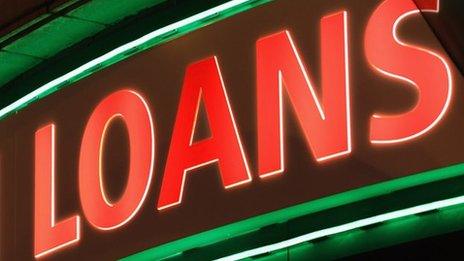Banks face new mis-selling scandal
- Published

More than 60,000 small businesses in the UK have fallen victim to a new bank mis-selling scandal, that MPs say could be "another PPI".
Firms were sold fixed-rate business loans to protect them against interest rate changes, but banks secretly added a swap, which had the reverse effect.
This led to firms going bankrupt.
"Embedded swaps" are unregulated. The British Bankers' Association (BBA) says any customer unhappy with a product should contact their bank.
On Thursday 500 small business leaders are gathering at a conference organised by campaign group Bully Banks in Westminster to hear MPs, barristers and derivative experts debate the issue, which is already the focus of an ongoing enquiry by the Treasury Select Committee.
'Aggressive targets'
Most small businesses were told by the banks that these fixed-rate loans were there to protect them in case of rate rises, many being told it was effectively a "free cap".
Though the banks had access to market data which from 2007 forecast a big fall in long-term interest rates, they continued to sell fixed-rate loans priced at around 6%.
Once a customer was signed up the banks would sell these loans on to the derivatives market, where traders would buy the fixed-rate element underpinned by the customer and sell back to the bank at a much lower floating rate.
As interest rates have been stuck at 0.5% for five years the derivative traders would receive the fixed rate of around 6% from the customer while paying out the true market rate of only 0.5%, pocketing the difference. The banks received large commissions for introducing the deals.
One High Street bank manager who wished to remain anonymous said: "We were all on aggressive targets. It was very much incentive-driven and we were financially rewarded if we sold these products and penalised if we didn't."
He added that if a customer requested a simple variable-rate loan he would do all he could to pass them on to the bank's treasury partners who would then "hard sell" derivative products wrapped up as simple fixed loans.
'Toxic nature'
Bully Banks says customers who signed up for fixed-rate deals were led to believe that if break fees applied, they would be in the range of 1-3% of the cost of the loan. But the hidden swap meant break costs were usually in the range of 20-25% and in some extreme cases as high as 50%.
Bully Banks chairman Jeremy Roe said: "People were totally unaware of the true toxic nature of these things and with only a few hundred having complained we are only seeing the tip of the iceberg."
Unlike standalone interest rate hedging products (IRHPs), widely referred to as swaps, the Financial Conduct Authority (FCA) classes embedded swaps as unregulated.
However, the head of the FCA's specialist supervision department, Nausicaa Delfas has told MPs that they have not ruled out taking "enforcement action", which could include hefty fines, against lenders for the inappropriate sale of these complex products.
The Treasury Select Committee is scrutinising the regulatory process of embedded swaps. Committee MP John Thurso said: "There is nothing wrong with selling a business a fixed-rate loan, however where the bank adds a hedge and fails to tell the customer I regard that, at best as mis-selling and at worst, immoral."
He added: "If [the banks] don't get a grip of the situation urgently there is a real risk this will turn into another PPI (payment protection insurance) scandal."
'Crazy to agree'
Businesses as diverse as shops, hotels, nurseries and even an English vineyard have all been affected. In 2010, Highdown Vineyard in West Sussex took out an agricultural loan with Lloyds Bank.
It sold them a simple fixed-rate deal comparable to a domestic mortgage. When they decided to change banks they expected to pay about £20,000 in penalties to exit the deal but the presence of the unknown derivative meant the figure was over £100,000.
"The bank claims that we had been made aware of potentially significant break costs but we had not been told this either verbally or in writing," said owner Aly Englefield.
"When we asked for documentary proof they could not provide it. Obviously if we had been made aware of the true nature of the deal we'd have been crazy to agree to it."
It was only after the Financial Ombudsman upheld their complaint that the loan was scrapped.
A spokesman for Lloyds Bank told the BBC: "Whilst we will not comment on individual customer matters, we are always keen to resolve the situation where a business customer is not satisfied with the banking service or product they receive from us."
The BBA said: "If business customers with a fixed rate loan or any other bank product find themselves unhappy with the service they've received then we urge them to speak with their bank to discuss what options might be available to them."